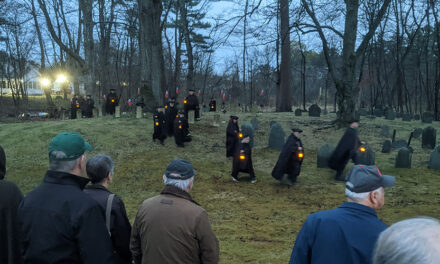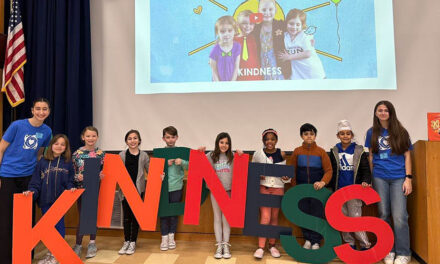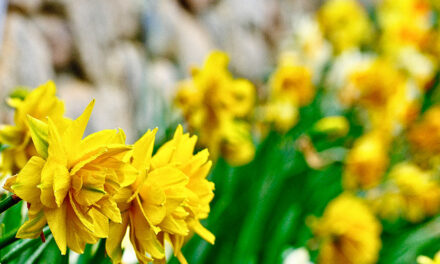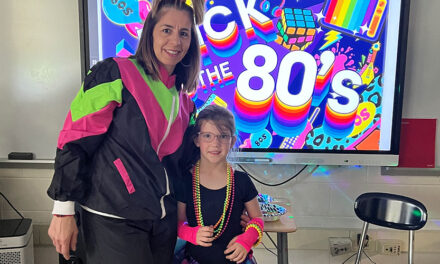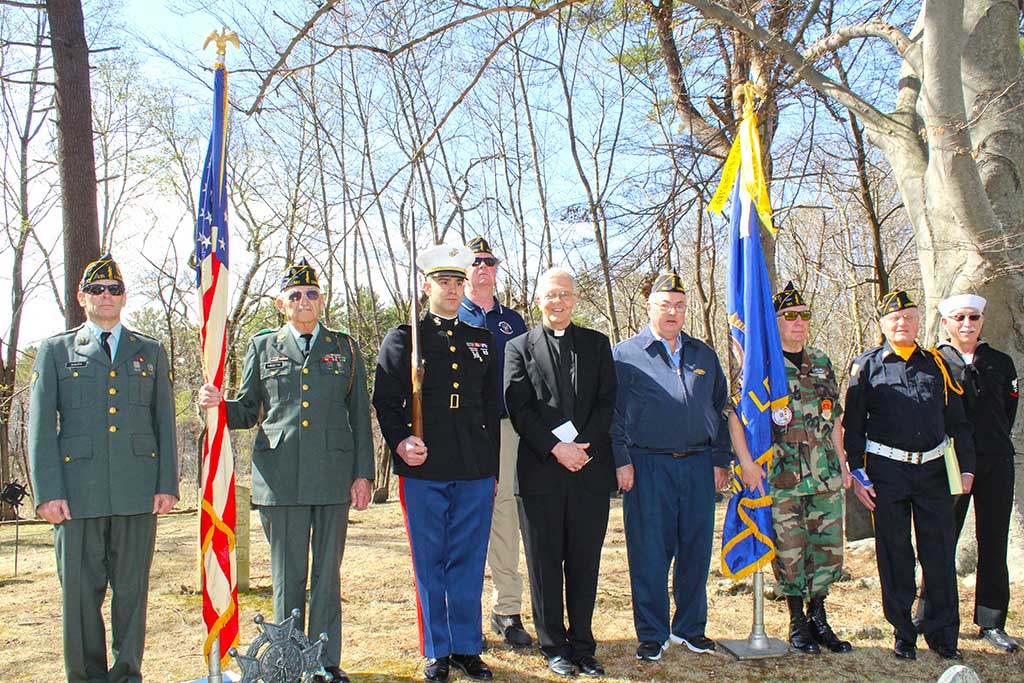
AMERICAN LEGION POST 131 held a Patriots Day ceremony at the Old Burying Ground on Monday. From left, American Legion Post 131 Commander and U.S. Army veteran Paul Donato, Army veteran Joseph Turcketta, Marine Corps veteran Charles Leach, Navy veteran Tom Bogart, Rev. Paul Ritt, Navy veteran John Harrigan, Army veteran John Lukas, Army veteran Ron Nutter and Veterans’ Services Officer and U.S. Navy veteran Bruce Siegel. (Dan Tomasello Photo)
Published in the April 19, 2017 edition
By DAN TOMASELLO
LYNNFIELD — On Monday, 30 residents gathered to honor the local heroes who fought 242 years ago in the battles of Lexington and Concord during American Legion Post 131’s first annual Patriots Day ceremony at the Old Burying Ground.
American Legion Post 131 Commander and U.S. Army veteran Paul Donato served as the master of ceremonies during the event. In addition to Donato and Veterans’ Services Officer Bruce Siegel, Army veteran Joseph Turcketta, Marine Corps veteran Charles Leach, Navy veteran Tom Bogart, Navy veteran John Harrigan, Army veteran John Lukas and Army veteran Ron Nutter also participated in the ceremony.
Donato said Patriots Day is among the most important patriotic holiday for Americans. The battles of Lexington and Concord were the first of the American Revolutionary War.
After attendees said the Pledge of Allegiance, Father Paul Ritt of Saint Maria Goretti gave the invocation. He said the Revolutionary War heroes who lost their lives during the Battles of Lexington and Concord “gave their lives so our nation could be born and become land of the free, and home of the brave.”
Donato gave a history lesson about the battles of Lexington and Concord.
“The battles of Lexington and Concord were fought by patriots,” said Donato. “Those people had come to this land and adopted it as their own. They loved America and were willing to support and defend it. If those brave patriots, who were mostly farmers, never had the courage or resolve to risk, and indeed give, their lives for a cause they felt was so important to them and future generations, it’s possible that America would have simply existed as another British colony. America may never have won independence and Americans would not celebrate Independence Day on the Fourth of July.”
The ceremony focused on Revolutionary War heroes from Lynnfield, which Nutter noted was previously called Lynn End because Lynnfield was part of Lynn during the Revolutionary War. Nutter recalled how the colonists became frustrated when the British monarchy “taxed all of the products that they bought.”
“It led to much unrest and anger,” said Nutter. “The colonists had no one to speak for them in the British government. A huge bone of contention was taxation without representation. The colonists had no representation in the British Parliament, and were taxed very heavily.”
Nutter said meeting houses were “the heart and soul of a colony.” He noted the Meeting House on the Town Common, which was built in 1714, is “the oldest meeting house in Massachusetts.”
“It’s 302 years old,” said Nutter. “It’s actually 62 years older than the Declaration of Independence.”
Nutter recalled how the Meeting House contained “a church on the top floor and a Meeting House on the bottom floor.” He said gunpowder was stored in the Meeting House’s attic prior to the Powder House getting built on Powder Hill Road.
According to Nutter, the Lynn End Minutemen met at the Meeting House on April 19, 1775 “because the word had got out that the British were coming.” He said the Minutemen gathered their weapons, gunpowder, water, food and other supplies before making the trek to Menotomy, which is now Arlington.
“Paul Donato traced this and said they walked through Wakefield, Stoneham, Woburn, Winchester and West Medford to Menotomy, which is called Arlington Center today,” said Nutter. “There, they met and engaged the British soldiers.”
During the battle, Donato said British soldiers killed adult men, looted and set houses on fire.
“By late afternoon, enough time had passed to allow significant members of the militia from 13 towns who responded to the alarm to converge on the retreating column,” said Donato.
While Donato noted it’s difficult to distinguish the soldiers who were from Lynn with soldiers from Lynnfield during the Revolutionary War, he said three colonists from Lynnfield died during the Battle of Lexington. The colonists were Daniel Townsend, William Flint and Thomas Hadley.
“Townsend lived in the central part of the town,” said Donato, while quoting passages from Thomas Wellman’s book “History of Lynnfield.”
“Flint and Hadley lived in the southerly part of the town.”
Donato noted local colonist Timothy Munroe was injured while fighting alongside Townsend at Jason Russell’s house in Menotomy.
“Mr. Munroe is deservedly mentioned by the Lynn historians,” said Donato while continuing to read passages from Wellman’s book. “He was standing behind a house with Daniel Townsend and firing at the British troops as they were coming down the road on the retreat toward Boston. Townsend had just fired and exclaimed, ‘there’s another Redcoat down,’ when Munroe, looking around, saw to his astonishment that they were completely hemmed in by the flank guard of the British Army, who were coming down the fields behind them.”
After Townsend and Munroe hid in Jason Russell’s house, Donato said British soldiers began firing on the home. He said Townsend “leaped through the end window, carrying the sash and all with him, and instantly fell dead” after being shot by British soldiers.
“Munroe followed and ran for his life,” said Donato while continuing to read passages from Wellman’s book. “He passed for a long distance between both parties, many of whom discharged their guns at him.”
Donato said Munroe was able to escape the battle despite being shot in the leg. He also noted Munroe assisted a British soldier during the battle.
“Mr. Munroe used his handkerchief to stop the flowing blood from the soldier’s wound,” said Donato while continuing to read passages from Wellman’s book. “To reward him for his kindness, the soldier took from his clothes a silver buckle, which Mr. Munroe gave to the late Mrs. Caleb Green, Sr. It is now in the possession of her grandchildren, the heirs of the late Joshua Green.”
Donato said 11 men were killed during the skirmish at Jason Russell’s house. He said 25 soldiers were killed in Menotomy on April 19, 1775, which he said was “half of all Americans killed that day, making it the bloodiest fighting on the very first day of the American Revolution.”
After Rev. Ritt gave the benediction, Lynnfield High School junior Anthony Wilkinson performed a moving rendition of “Taps.”

